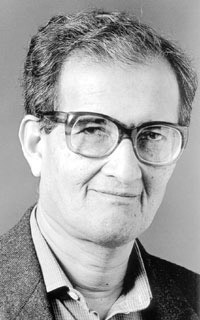
The liberal paradox, also Sen paradox or Sen's paradox, is a logical paradox proposed by Amartya Sen which shows that no means of aggregating individual preferences into a single, social choice, can simultaneously fulfill the following, seemingly mild conditions:
- The unrestrictedness condition, or U: every possible ranking of each individual's preferences and all outcomes of every possible voting rule will be considered equally,
- The Pareto condition, or P: if everybody individually likes some choice better at the same time, the society in its voting rule as a whole likes it better as well, and
- Liberalism, or L (from which the theorem derives its gist): all individuals in a society must have at least one possibility of choosing differently, so that the social choice under a given voting rule changes as well. That is, as an individual liberal, anyone can exert their freedom of choice at least in some decision with tangible results.
Sen's result shows that this is impossible. The three, rather minimalistic, assumptions cannot all hold together. The paradox—more properly called a proof of contradiction, and a paradox only in the sense of informal logic—is contentious because it appears to contradict the classical liberal idea that markets are both Pareto-efficient and respect individual freedoms.[1][2][3]
Sen's proof, set in the context of social choice theory, is similar in many respects to Arrow's impossibility theorem and the Gibbard–Satterthwaite theorem. As a mathematical construct, it also has much wider applicability: it is essentially about cyclical majorities between partially ordered sets, of which at least three must participate in order to give rise to the phenomenon. Since the idea is about pure mathematics and logic, similar arguments abound much further afield. They, for example, lead to the necessity of the fifth normal form in relational database design. The history of the argument also goes deeper, Condorcet's paradox perhaps being the first example of the finite sort.
- ^ Sen, Amartya (1970). "The Impossibility of a Paretian Liberal" (PDF). Journal of Political Economy. 78 (1): 152–157. doi:10.1086/259614. JSTOR 1829633. S2CID 154193982.
- ^ Sen, Amartya (1984) [1970]. Collective Choice and Social Welfare. New Holland. ISBN 978-0444851277.
- ^ Sen, Amartya (2004). Rationality and Freedom. Belknap Press of Harvard University Press. ISBN 978-0674013513.